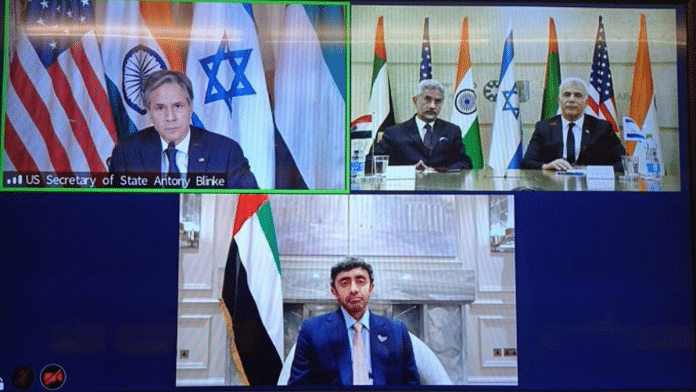If a buzzword has evolved in Indian foreign policy in the recent past, it is the ‘Quad’. India’s engagement and cooperation in the Indo-Pacific with like-minded countries – together termed the Quadrilateral Dialogue or simply Quad – is being hailed as a strong counterbalance to the recalcitrant dragon in the room. The Quad has been the subject of much fanfare and countless think-tank columns analysing the grouping’s contribution to India’s Act East policy.
But, last week, during External Affairs Minister S. Jaishankar’s visit to Israel, India’s convergence with a new ’Quad’ was announced – this time with Israel, the United Arab Emirates and the common friend United States of America.
Though commentators are loath to labelling this new grouping as ‘Quad’ as yet, it certainly evokes significant shifts in India’s policy priorities in West Asia as well as the Unites States’ increasing tendency to delegate authority and responsibility to regional players. The US, under President Joe Biden, seems to be in its sunset years with respect to its presence in the Middle East. The process of winding up started under the aegis of the Donald Trump administration when it oversaw the diplomatic normalisation between Israel and the UAE and Bahrain – titled the Abraham Accords. This US effort at bridging the gulf between Sunni Gulf countries and Israel bodes well not only for the region, but also for its extended neighbours like India.
The new grouping, read along with the Abraham Accords, means that India would be able to upgrade its already-established bilateral ties with Israel and the UAE, to more dynamic and synergetic multilateral ties. While Israel is a trusted defence partner of India, the UAE is amongst the top oil exporters to India. With India undertaking an overhaul in its defence infrastructure and the critical energy scenario prevailing in the world, this engagement is quite significant. Moreover, with the US increasing its proximity with India on various issues including maritime security, defence cooperation and an overarching anti-China bonhomie, India seems to be its natural choice to bequeath a greater role to in the West Asian theatre.
The four-nation framework would foster support and cooperation in various domains like infrastructure, technology, maritime security and trade. In May this year, a project was commissioned in which Ecoppia, an Israeli company, would manufacture robotic solar cleaning technology in India, meant for a project in the UAE. This was a unique engagement among the three countries, which could almost be looked upon as a trilateral confidence-building measure. The three countries, therefore, were likely to emerge as natural partners for such a grouping.
Also read: Why US and India are taking on China with a ‘Middle Eastern Quad’
Securing bilateral interests
India must leverage the quadrilateral to secure its bilateral interests as well. Indians account for the largest expatriate community of the UAE, the community constituting blue-collar and white-collar workers as well as individuals engaged in business. As for Israel, apart from negotiating a free-trade agreement, India can work on the strengthening of bilateral ties as the countries celebrate 30 years of upgraded diplomatic relations in 2022. In this scheme of affairs, the auspices of the United States can only help matters.
However, the new ‘Quad’ is not admittedly a strategic grouping yet. It is restricted to being an international forum for economic cooperation, with a focus on exploring, emphasising and ultimately channelizing the unique capabilities of each country into a joint working group. But, given the broader challenges which face West Asia and its extended neighbourhood, the development of a strategic perspective in the grouping is not a remote possibility. Iran is hanging like the sword of Damocles over the heads of Sunni monarchies with respect to sectarian strife and of Israel with respect to the Hezbollah.
While Iran is a declared adversary of the first two parties, India has maintained strategic balance when it comes to Iran. Even after the signing of the Iran-China deal in which China agreed to invest $400 billion in Iran over 25 years, in return for discounted supply of oil, Dr. Jaishankar was the first to call on Ebrahim Raisi when he was elected president of the Shia-majority nation. India must ensure that its shared interests with Israel and the UAE, does not embitter its relationship with Iran, given its interest in strategic projects like the Chabahar port.
As per a 2019 Brookings survey, Israel and the UAE were recognised as India’s most important regional partners. Their co-existence in the new ‘Quad’ along with India, gives a significant impetus to India’s prominence in West Asia. With the US coiling up its international tentacles and India looking to position itself as a global player in the strategic and economic front, the quadrilateral dialogue comes at quite a critical juncture. If the Indo-Pacific Quad is bolstering India’s assertion east of the Indian Ocean, the new ‘Quad’ is likely to consolidate India’s presence to the west.
Prantik Sengupta is a student of Jadavpur University, West Bengal. Views are personal.




